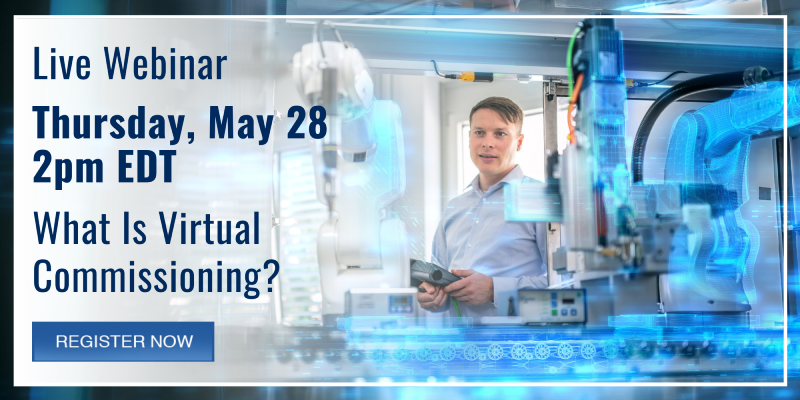What Is Virtual Commissioning?

The challenges in the manufacturing and logistics industries are mounting. To keep up with the unprecedented pressure of competition, many companies introduce increasingly sophisticated automation systems. However, this tends to be a complicated task. In order to get automation systems working fluently, Virtual Commissioning is imperative to manufacturing businesses.
Nearly two-thirds of commissioning time is spent testing and fixing errors within the control software once the hardware has already been assembled on site. By utilizing both the software platform for Digital Twin modeling and virtual commissioning- testing, debugging, and validating can be done from your computer, before even connecting it to the real system.
Learn more in our upcoming webinar “What Is Virtual Commissioning?”
Thursday, May 28 2020
2 pm EDT
Register Now!
Commissioning vs Virtual Commissioning
The commissioning process is a set of engineering techniques and procedures used to check, inspect, and test all operational components of a project. In short, virtual commissioning is the ability to perform these routine tests in a virtual environment by utilizing 3D technology. Virtual commissioning solutions analyze plants, production cells, machines, and parts without the need for physical prototypes or risk-inherent tests.
Challenges in Commissioning
Although Commissioning only accounts for 25% of development time, it is predicted that up to 70% of delays are due to errors in the control software. This is because commissioning is often complex. Efforts for real commissioning are difficult to calculate. Unclear requirements and inconsistent data is just the tip of the iceberg when it comes to issues with the traditional commissioning process. Tests occur under extreme time constraints and real testing is expensive and elaborate.
What are the Benefits of Virtual Commissioning?
The most common reason to adopt virtual commissioning is to reduce the risk of errors late in the development process. However, other benefits include:
• Reduced costs due to virtual prototypes
• Shortened commissioning process
• Increased safety for workers
• Decreased equipment damage
• More design alternatives
• Validated performance and behaviors
Research shows that virtual commissioning can improve the control software quality in terms of fulfilled requirements by more than 100% while also reducing commissioning times by 75%.
Learn More About Virtual Commissioning
If you are interested in learning more about Virtual Commissioning, our upcoming webinar “What Is Virtual Commissioning?” is a great start!
Thursday, May 28 2020
2 pm EDT
Register Now!
Did you miss the live webinar? Check out our on-demand webinars and for more information, reach out to This email address is being protected from spambots. You need JavaScript enabled to view it., or contact us.